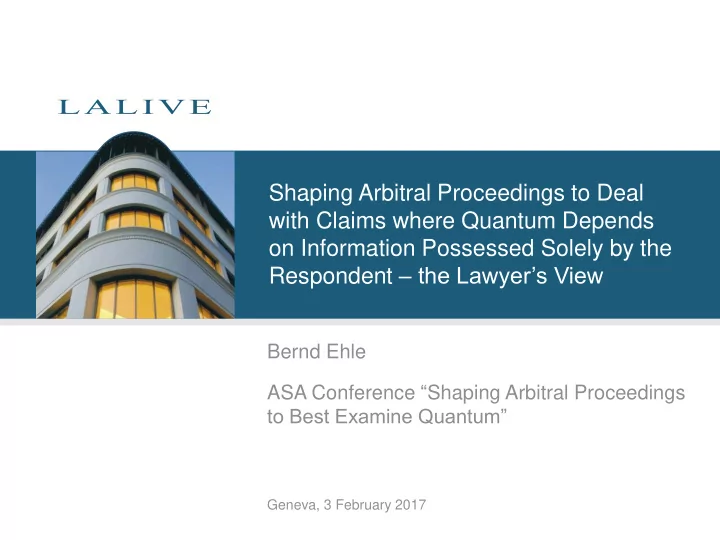

Shaping Arbitral Proceedings to Deal with Claims where Quantum Depends on Information Possessed Solely by the Respondent – the Lawyer’s View Bernd Ehle ASA Conference “ Shaping Arbitral Proceedings to Best Examine Quantum” Geneva, 3 February 2017
Information Possessed Solely by the Respondent – the Lawyer’s View Starting Point Claimant lacks access to information needed to quantify its claim Respondent holds the information but refuses voluntary disclosure US-style pre-trial discovery not available Claimant files for arbitration and claims, inter alia, access to information 2
Information Possessed Solely by the Respondent – the Lawyer’s View Shaping the Proceedings Enable Claimant to obtain information necessary to quantify its claim – if justified Adverse inferences of no avail to Claimant Clarification at the outset (e.g. at case management conf.): Nature of requested information Grounds for request: substantive vs. procedural right to information Different scenarios imaginable 3
Information Possessed Solely by the Respondent – the Lawyer’s View Scenario 1: Document Production Request Document Quantified Unquantified production Disclosure payment Award payment claim request claim Issues: Availability of document production? Standard: relevance / materiality / specificity, etc. Procedural right to documents, not substantive right to information Claimant to bear cost of extracting information 4
Information Possessed Solely by the Respondent – the Lawyer’s View Scenario 2: Action by stages Decisions issued in stages (bifurcation) Stage 1: claim for disclosure of information + unquantified payment claim Possibly combined with request for affirmation that information is accurate and complete or for access to independent auditor Stage 2: quantification of payment claim subsequent to disclosure Procedural economy joinder of actions to avoid multiple proceedings all claims pending from the outset 5
Information Possessed Solely by the Respondent – the Lawyer’s View Action by stages – Origins German law Sec. 254 Civil Procedure Code (“ Stufenklage ” ) Swiss law Decision of Federal Supreme Court 123 III 140 of 17 February 1997 Sec. 85 Civil Procedure Code (Action for an unquantified debt) 6
Information Possessed Solely by the Respondent – the Lawyer’s View Action by stages – Conditions Substantive right to information Claimant is – through no fault of its own – ignorant as to the extent of its claim Respondent can easily provide the information (not overly burdensome) Information sought must be reasonable in light of all circumstances (i.e. necessary to compute quantum – not more, not less) 7
Information Possessed Solely by the Respondent – the Lawyer’s View Action by stages 2 nd stage Final Award Quantified 1 st stage payment Disclosure claim Interim Partial Claim for Award on disclosure (i) claim for + disclosure unquantified (ii) liability payment claim 8
Information Possessed Solely by the Respondent – the Lawyer’s View Action by stages in arbitration – Examples Decisions of the Swiss Federal Supreme Court: 4A_2/2007 dated 28 March 2007 (ASA Bull. 2007, 630) 4A_69/2009 dated 8 April 2009: interim partial award in dispute over fees under consultancy agreement (discussed in ASA Bull. 2010, 130-136) 4A_424/2011 dated 2 November 2011 Decision of Higher Regional Court of Munich of 22 January 2010: challenge of partial award issued in dispute over a sales agent’s commission (on DIS website) 9
Information Possessed Solely by the Respondent – the Lawyer’s View Action by stages – Issues and complexities Long-winded / more time-consuming Partial Award: possible scrutiny / challenge / enforcement Combination with claims for which no disclosure is needed Modalities of audit determined by governing law or in contract Confidentiality / data protection Non-participation of Respondent Value in dispute 10
Information Possessed Solely by the Respondent – the Lawyer’s View Scenario 3: Combination? Agreement? Claimant requests information based on substantive right to disclosure also through document production Risk of confusion / procedural inefficiencies Uncertainty as to applicable standard (IBA Evidence Rules by analogy?) Agreement between Parties to deal with disclosure requests as a procedural (rather than a substantive) matter? 11
Information Possessed Solely by the Respondent – the Lawyer’s View Conclusions Distinguish between substantive right and procedural right to information Assess disclosure request in light of totality of claims to ensure procedural efficiency No “one -size-fits- all” solution : room for creativeness If possible: Parties agree in good faith as to how to shape proceedings to deal with disclosure requests 12
Thank you! Bernd Ehle behle@lalive.ch
Recommend
More recommend